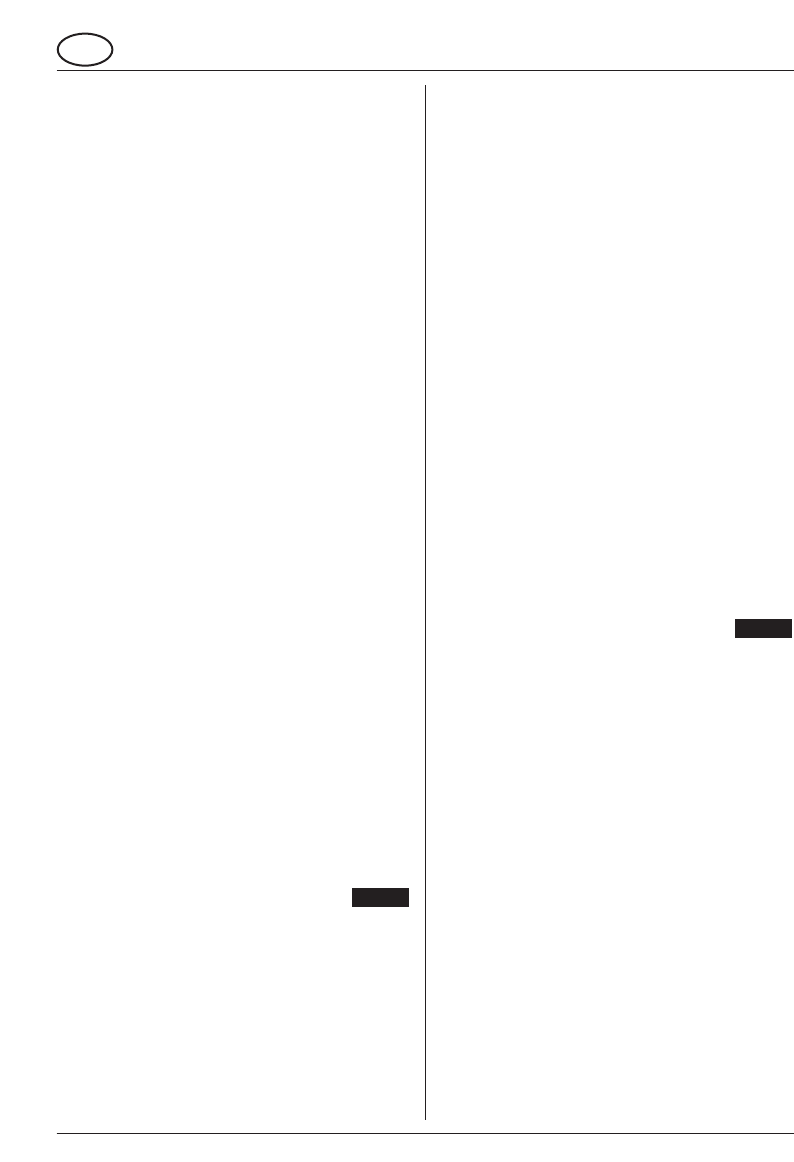
produce general numbness. Continual or regular users
should therefore monitor closely the condition of their
hands or fingers. If any of the symptoms appear, seek
immediate medical advice.
3 Never carry the chainsaw with the engine running.
Whenever carrying a chainsaw, even for short distances,
the chain should be covered by the chain guard (scabbard)
and the bar should point backwards.
When transporting the chainsaw in a vehicle, secure the
saw to prevent fuel spillage.
4 To avoid kick-back, do not attempt to cut with the nose of
the bar. Ensure the engine is running at full throttle before
commencing to cut. To avoid kick-back, do not let the
nose of the bar come into contact with logs, branches, the
ground or any other obstruction. Do not allow any part of
the chain to come into contact with rock, nails or wire
fence
Ensure the chain is kept sharp and correctly tensioned.
Keep the spike or the saw body against the wood when
cutting. Use only genuine accessories and spare parts. We
recommend you have your unit periodically checked and
serviced by an authorised dealer.
Do not use chainsaw above shoulder height.
5 Do not operate the chainsaw near a naked flame or spilled
fuel. Only operate the chainsaw outside and in well ventila-
ted areas.
After re-fuelling, always wipe off any spilled fuel. Move the
chainsaw away from the fuelling point before starting the
engine.
6 Keep by-standers and animals out of the work area; at a
minimum distance of 10 m or twice the timber length. If
necessary, use warning signs to keep on-lookers at a
distance.
Carefully survey the working site to note any hazards, eg.
roads, paths, electricity cables, dangerous trees etc. Do not
use the chainsaw if the device for stopping the chain (safety
chainbrake) does not work correctly. Never place hands on
the chain whilst the engine is running. Ensure someone is
within hearing distance in case of an accident. If this is not
possible, it is recommended that users operating chain-
saws in remote areas carry an adequate first-aid kit with
them and ensure someone knows their location. Never
leave the engine running while the tool is unattended.
ONLY USE ORIGINAL SPARE PARTS AND ACCESSO-
RIES.
BAR AND CHAIN
INSTALLATION
Ensure engine is always switched off before fitting or adju-
sting chain. Wear a pair of protective gloves when fitting
or adjusting chain.
A. Clutch guard
B. Inner bar plate
C. Bar mounting bolts
D. Chain tensioning screw
E. Oil hole
F. Outer bar plate
G. Bar retention nuts
H. Sprocket
I. Adjusting screw
C
Remove the clutch guard (A) and the outer bar plate (F).
Check that the oil hole (E) is free from impurities. Fit the chain
over the sprocket (H). Ensure correct direction of cutter tooth.
Put the bar in position over studs (C) slide it towards the
sprocket. Fit the chain into the bar groove and slide the bar
forwards.
Make sure that the tang chain tensioning screw (D) fits into the
hole in the bar (E). Replace the outer bar plate and the clutch
guard. Screw the two bar retention nuts finger tight (G).
Tension the chain by turning the adjusting screw (I) clockwise
while raising the tip of the bar. The tension is sufficient if the
chain is snug on the bar but still moves freely around the bar
when pulled by hand. Tighten the two bar retention nuts secu-
rely.
Always use the combination tool to install and tension the
chain.
RUNNING IN A NEW CHAIN
The chain must always be cold when carrying out adjust-
ment.
1 Let the chain run slowly for a few minutes. Check that the
oil pump is delivering oil onto the chain.
2 Stop the engine and adjust the chain tension.
3 Check the tension of a new chain more frequently during
initial usage and adjust as necessary.
4 Repeat adjusting until the chain does not stretch any more.
Never touch the chain while the engine is running.
FUEL MIX
Use only fuel recommended by this manual. This product
is fitted with a 2-stroke engine and therefore requires a
2-stroke petrol and oil mix. Use leaded (4 Star) or unleaded
petrol with a minimum octane rating of 90.
Only use oil from sealed containers. In order to obtain a good
fuel mix, put the oil into the container before the petrol.
The use of sub-standard petrol or oil may reduce performan-
ce or reduce the life of certain components.
LEADED PETROL
If using leaded petrol, the correct fuel mix is achieved by
either using 5% (20:1) of a well known brand of 2-stroke engi-
ne oil, or else 2.5% (40:1) of special McCulloch engine oil.
UNLEADED PETROL
If using unleaded petrol, you must use a totally synthetic 2-
stroke engine oil or McCulloch branded 2-stroke engine oil. In
either case use 2.5% (40:1) of oil.
IMPORTANT
Always shake this fuel mix vigorously each time you use it.
We recommend to carry out this operation each time you use
the fuel.
Fuel mix properties deteriorate with time, we therefore recom-
mend that you only make the quantity of fuel mix you will
need for each usage. Do not use fuel mix more than a week
old as this could damage the engine.
WARNING
D
2
UK
















